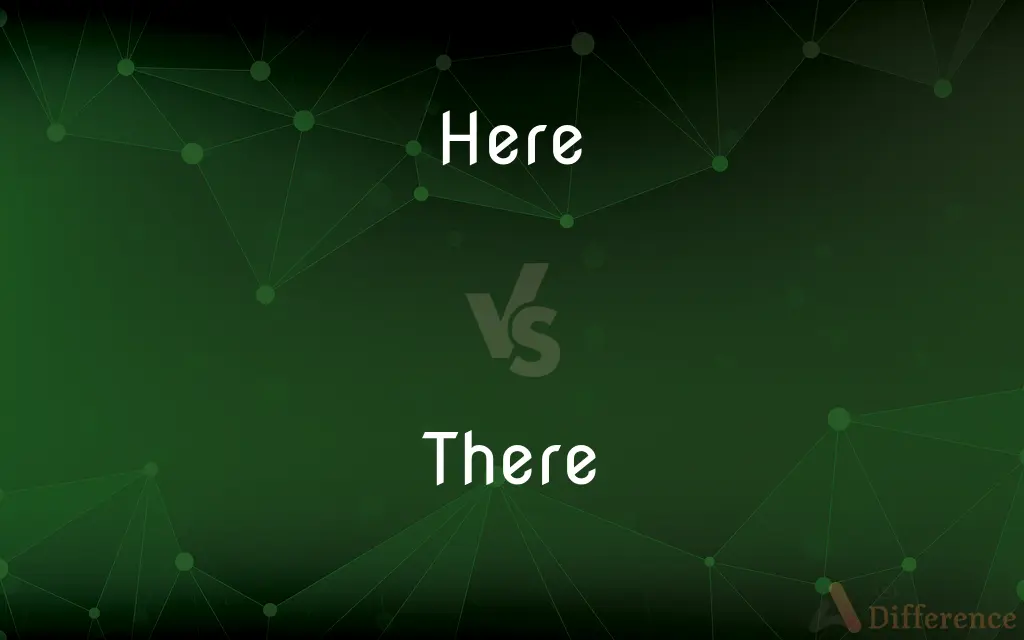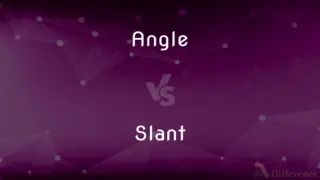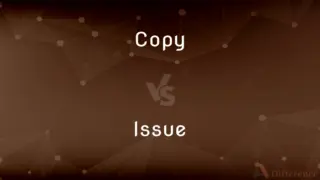Here vs. There — What's the Difference?
By Urooj Arif & Fiza Rafique — Updated on March 11, 2024
Here and there are used to describe location, with "here" referring to a location close to the speaker and "there" to a location away from the speaker.

Difference Between Here and There
Table of Contents
ADVERTISEMENT
Key Differences
Here indicates a location close to the speaker, often implying presence or a specific point, whereas there denotes a location distant from the speaker, suggesting absence or a general area. Here is used in contexts where the speaker wants to highlight proximity or immediacy, while there is employed to indicate separation, distance, or direction away from the speaker's current location. For example, "here" is used in sentences like "Come here," emphasizing closeness, whereas "there" is used in sentences like "Look over there," highlighting a point away from the speaker.
Here is subjective, changing based on the speaker's location, whereas there is more objective, often referring to a specific, identifiable location regardless of the speaker's position. "Here" can also suggest a current state or condition, as in "Here is where we stand," while "there" can imply a future or desired state, as in "We want to get there."
Here often conveys immediacy and involvement, as in "Here's the thing," whereas there can imply remoteness or exclusion, as in "There's no way to know." The use of "here" can create a sense of inclusion and urgency, while "there" can establish a sense of detachment or anticipation.
Here and there can also function in abstract or figurative contexts, where "here" represents a current situation or point in a discussion, and "there" indicates a different situation or point, as in "We can't stay here; we need to get there."
Comparison Chart
Proximity
Close to the speaker
Away from the speaker
ADVERTISEMENT
Context
Presence or a specific point
Absence or a general area
Subjectivity
Changes with the speaker's location
More objective, specific location
Connotation
Immediacy, involvement
Remoteness, direction away
Usage
Highlighting closeness or current state
Indicating separation or future state
Compare with Definitions
Here
Indicating the location of the speaker.
I am here in the room.
There
At that place.
My friends are there at the park.
Here
Used to indicate presence or readiness.
Here! When your name is called.
There
Used to introduce a sentence or clause.
There is something you should know.
Here
At this point in the discussion or document.
Here, the author contradicts himself.
There
In that matter, respect, or relation.
I agree with you there.
Here
Used to draw attention to something or someone.
Look here, this is important.
There
Used to comfort or console.
There, there, it will be alright.
Here
Indicating a specific point or moment.
It is here that we see the difference.
There
Used to express satisfaction or draw attention.
There! I've finished the task.
Here
In, at, or to this place or position
We leave here today
They have lived here most of their lives
I'm getting out of here
There
At or in that place
Sit over there.
Here
Used when introducing something or someone
Here's a dish that is quick to make
There
To, into, or toward that place
Wouldn't go there again.
Here
Used when indicating a time, point, or situation that has arrived or is happening
Here we encounter the main problem
Here is your opportunity
There
At that stage, moment, or point
Stop there before you make any more mistakes.
Here
Used to attract someone's attention
Here, let me hold it
There
In that matter
I can't agree with him there.
Here
Indicating one's presence in a roll-call.
There
In a readily accessible or discoverable state
The answer is out there. All we have to do is look for it.
Here
At or in this place
Stop here for a rest.
There
Used especially for emphasis after the demonstrative pronoun that or those, or after a noun modified by the demonstrative adjective that or those
That person there ought to know the directions to town.
Here
At this time; now
We'll adjourn the meeting here and discuss remaining issues after lunch.
There
(Nonstandard) Used for emphasis between a demonstrative adjective meaning "that" or "those" and a noun
"You see them there handles?" (Cormac McCarthy)."I tell you ... that you buried paving-stones and earth in that there coffin" (Charles Dickens).
Here
At or on this point, detail, or item
Here I must disagree.
There
That place or point
Stopped and went on from there.
Here
In the present life or condition.
There
Used to express feelings such as relief, satisfaction, sympathy, or anger
There, now I can have some peace!.
Here
To this place; hither
Come here, please.
There
(location) In a place or location (stated, implied or otherwise indicated) at some distance from the speaker (compare here).
Here
Used especially for emphasis after the demonstrative pronoun this or these, or after a noun modified by the demonstrative adjective this or these
This tire here is flat.
There
(figuratively) In that matter, relation, etc.; at that point, stage, etc., regarded as a distinct place.
He did not stop there, but continued his speech.
They patched up their differences, but matters did not end there.
Here
(Nonstandard) Used for emphasis between the demonstrative adjective this or these and a noun
This here tire is flat.
There
(location) To or into that place; thither.
Here
Used to respond to a roll call, attract attention, command an animal, or rebuke, admonish, or concur.
There
(obsolete) Where, there where, in which place.
Here
This place
"It would be difficult from here, with the certainty of armed gunmen inside, to bring him out alive" (Howard Kaplan).
There
In this world, used to say that someone or something exists; see pronoun section below.
Here
The present time or state
We are living in the here and can only speculate about the hereafter.
There
Used to offer encouragement or sympathy.
There, there. Everything is going to turn out all right.
Here
Variant of Hera.
There
Used to express victory or completion.
There! That knot should hold.
Here
(location) In, on, or at this place.
You wait here while I fetch my coat.
Flu season is here.
Ms. Doe is not here at the moment.
There
That place.
Here
(location) To this place; used in place of the more dated hither.
Please come here.
There
That status; that position.
You rinse and de-string the green beans; I'll take it from there.
Here
(abstract) In this context.
Derivatives can refer to anything that is derived from something else, but here they refer specifically to functions that give the slope of the tangent line to a curve.
There
Used as an expletive subject of be in its sense of “exist”, with the semantic, usually indefinite subject being postponed or (occasionally) implied.
There are two apples on the table. [=Two apples are on the table.]
There is no way to do it. [=No way to do it exists.]
Is there an answer? [=Does an answer exist?]
No, there isn't. [=No, one doesn't exist.]
Here
At this point in the argument, narration, or other, usually written, work.
Here endeth the lesson.
There
Used with other intransitive verbs of existence, in the same sense, or with other intransitive verbs, adding a sense of existence.
If x is a positive number, then there exists [=there is] a positive number y less than x.
There remain several problems with this approach. [=Several problems remain with this approach.]
Once upon a time, in a now-forgotten kingdom, there lived a woodsman with his wife. [=There was a woodsman, who lived with his wife.]
There arose a great wind out of the east. [=There was now a great wind, arising in the east.]
Here
(abstract) This place; this location.
An Alzheimer patient's here may in his mind be anywhere he called home in the time he presently re-lives.
Here is where I met my spouse twelve years ago.
There
Used with other verbs, when raised.
There seems to be some difficulty with the papers. [=It seems that there is some difficulty with the papers.]
I expected there to be a simpler solution. [=I expected that there would be a simpler solution.]
There are beginning to be complications. [=It's beginning to be the case that there are complications.]
Here
(abstract) This time, the present situation. en
There
That.
Therefor, thereat, thereunder
Here
Filler after a noun or demonstrative pronoun, solely for emphasis.
John here is a rascal.
There
(colloquial) Appended to words of greeting etc.
Hi there, young fellow.
Oh, hello there, Bob, how are you doing?
Here
Filler after a demonstrative pronoun but before the noun it modifies, solely for emphasis.
This here orange is too sour.
There
In or at that place.
The Lord God planted a garden eastward in Eden; and there he put the man whom he had formed.
Here
(slang) Used semi-assertively to offer something to the listener.
Here, now I'm giving it to you.
There
To or into that place; thither.
The rarest that e'er came there.
A knight there was, and that a worthy man.
There is a path which no fowl knoweth.
Wherever there is a sense or perception, there some idea is actually produced.
There have been that have delivered themselves from their ills by their good fortune or virtue.
Spend their good there it is reasonable.
Here
Used for emphasis at the beginning of a sentence when expressing an opinion or want.
Here, I'm tired and I want a drink.
There
A location other than here; that place;
You can take it from there
Here
Hair.
There
In or at that place;
They have lived there for years
It's not there
That man [who is] there
Here
See Her, their.
There
In that matter;
I agree with you there
Here
Her; hers. See Her.
There
To or toward that place; away from the speaker;
Go there around noon!
Here
In this place; in the place where the speaker is; - opposed to there.
He is not here, for he is risen.
Here
In the present life or state.
Happy here, and more happy hereafter.
Here
To or into this place; hither. [Colloq.] See Thither.
Here comes Virgil.
Thou led'st me here.
Here
At this point of time, or of an argument; now.
The prisoner here made violent efforts to rise.
Here
The present location; this place;
Where do we go from here?
Here
Queen of the Olympian gods in ancient Greek mythology; sister and wife of Zeus remembered for her jealously of the many mortal women Zeus fell in love with; identified with Roman Juno
Here
Being here now;
Is everyone here?
Present company excepted
Here
In or at this place; where the speaker or writer is;
I work here
Turn here
Radio waves received here on Earth
Here
In this circumstance or respect or on this point or detail;
What do we have here?
Here I must disagree
Here
To this place (especially toward the speaker);
Come here, please
Here
At this time; now;
We'll adjourn here for lunch and discuss the remaining issues this afternoon
Common Curiosities
How is "there" used to indicate distance?
"There" is used to refer to a location or point away from the speaker, indicating distance or separation.
Are "here" and "there" interchangeable?
No, they serve different purposes in indicating proximity or distance and cannot be used interchangeably without altering the meaning.
What role do "here" and "there" play in directional instructions?
They are crucial in giving directions, with "here" indicating a starting point or current location and "there" indicating a destination or direction.
How do "here" and "there" affect the tone of a statement?
"Here" can create a sense of immediacy and involvement, while "there" can suggest detachment or anticipation.
What does "here" imply in communication?
"Here" implies proximity or presence related to the speaker's current location.
Do "here" and "there" have specific grammatical roles?
Both primarily function as adverbs but can also serve as pronouns or interjections, depending on their use in a sentence.
Can "here" and "there" be used figuratively?
Yes, both can be used figuratively to represent points in time, stages in a process, or positions in an argument.
Is there a cultural or contextual preference for using "here" or "there"?
Usage can vary by culture or context, but generally, "here" emphasizes proximity and "there" distance, with preferences depending on the intended message or emphasis.
Can "here" and "there" be used in time expressions?
Yes, they can metaphorically indicate points in time, like "here in the 21st century" or "back there in the 90s."
How does context affect the meaning of "here" and "there"?
Context can significantly affect their meanings, with "here" emphasizing closeness or current situations and "there" highlighting distance or different situations.
How do "here" and "there" interact with personal perspective?
"Here" is subjective and can change with the speaker's location, while "there" is more objective, often referring to a known or fixed location.
Can "here" and "there" be used in non-physical contexts?
Yes, they can refer to abstract concepts, such as points in a discussion or stages in a process.
Can the use of "here" and "there" affect reader or listener engagement?
Yes, strategically using "here" can create a sense of immediacy and engagement, while "there" can evoke a sense of distance or reflection.
Are there any common idioms or expressions using "here" and "there"?
Yes, expressions like "here today, gone tomorrow" or "out there" leverage these words to convey fleeting presence or unknown, distant realms.
How do "here" and "there" contribute to narrative storytelling?
They help establish settings, distinguish between scenes or perspectives, and guide the reader through different locations or points of view.
Share Your Discovery

Previous Comparison
Angle vs. Slant
Next Comparison
Copy vs. IssueAuthor Spotlight
Written by
Urooj ArifUrooj is a skilled content writer at Ask Difference, known for her exceptional ability to simplify complex topics into engaging and informative content. With a passion for research and a flair for clear, concise writing, she consistently delivers articles that resonate with our diverse audience.
Co-written by
Fiza RafiqueFiza Rafique is a skilled content writer at AskDifference.com, where she meticulously refines and enhances written pieces. Drawing from her vast editorial expertise, Fiza ensures clarity, accuracy, and precision in every article. Passionate about language, she continually seeks to elevate the quality of content for readers worldwide.














































